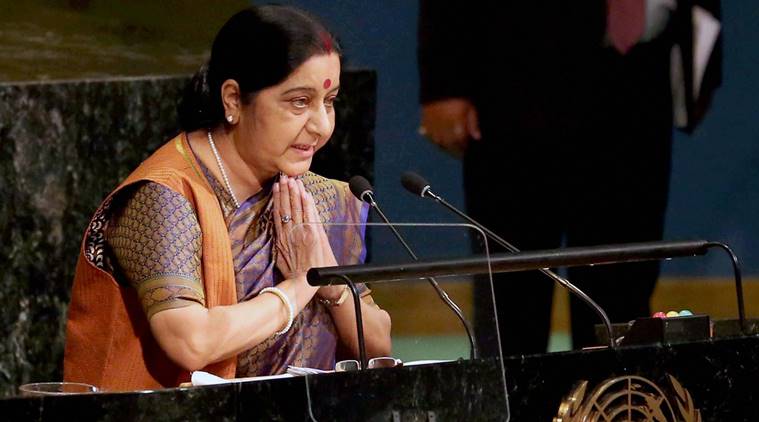Recently Pakistan was embarrassed in the UN General Assembly by its Permanent Representative’s gaffe, when she waved the photograph of a Palestinian girl injured in an Israeli raid and tried to pass it off as a Kashmiri victim of alleged Indian atrocities. Much as Pakistan’s international embarrassment gives us a high, the fact remains that Islamabad has, in most cases, got away lightly for the turbulence and chaos it has wreaked on the world at large.
Living in Delhi, watching our television channels and reading the lively newspapers, one starts to imagine that all of India’s adversaries are under international pressure for the wrongs they do to this nation. This is delusional. It is good to step outside India occasionally and informally interact with international players and personalities. Pakistan may not exactly be thriving, but in world forums it certainly seems to get space. It uses that space to create a perception that Pakistan is the biggest sufferer of terrorism. India’s efforts somehow do not seem to get across the message that the claim is untrue and that Pakistan is the largest exporter of terror. This is despite some high-end diplomatic achievements in the recent past.
Surprisingly, few analysts, Indian and foreign, view Pakistan for its geostrategic value: It controls access to the heart of Asia and, in reverse, to the Indian Ocean. This will remain so as long as Iran is isolated. Without Pakistan’s willing assistance no foreign force can fight in Afghanistan. Leave alone the shenanigans and subterfuge Pakistan’s agencies weave, sheer logistics will ensure that. Can the US and the International Security Assistance Force fight with its logistics base at an airhead in Tajikistan or Uzbekistan? So, even as President Trump puts Pakistan on notice and places strictures on Habib Bank, it’s a question of how far and for how long can the pressure be maintained. A good strategic mind should picture that Pakistan is one of the rarest of nations which has five civilisations as neighbours and each of them has a stake in its territory. That enhances its strategic importance, especially since the US, which is not a neighbour, has even greater stakes than its neighbours.
Nowhere was the importance of Pakistan more evident to me than, of all places, in Israel. It is not because Islamabad’s activities came under discussion at the recent World Summit on Counter Terrorism at Herzliya, Israel, but because they did not. The conference, which has acquired an iconic status in the world of strategic affairs and analysis, was focused on the terror threats in the Middle East and its linkages to Europe. Even in brief mentions about the history of violent extremism, Pakistan was absent. Attempts to draw the attention of the largely Israeli and western audiences towards the role of Pakistan in the spread of radical Islam and the involvement of Pakistani henchmen in many acts of violence in the western world cut no ice. What is more surprising is there were Pakistanis from the western world on the stage dropping platitudes and conveying greetings as if that country is a moderate haven in the Islamic world.
While Indian diplomacy is of a high order, Indian authorities perhaps do not realise that Pakistan undertakes a focused quasi diplomatic campaign to project it as the most moderate of nations. Retired diplomats, senior military officers and some academics, suave and articulate, are leading the charge in major world capitals and speak at all important think tanks, where they sell Islamabad’s line. London’s famed strategic speaking circuit, Washington’s think tanks and even Belgium’s numerous forums under the aegis of the European Union are places where the Pakistani presence is most noticeable. They help create the impression that Pakistan is facing deep challenges from Islamic extremist violence because they focus mostly on the internal security situation. The success of operations Zarb-e-Azb and Radd-ul-Fasad, the cleaning up of Karachi’s badlands and the neutralisation of anti-minority groups such as Lashkar e Jhangvi are talked about. Hardly anyone in these audiences is aware of the Lashkar-e-Toiba (LeT), Jaish-e-Muhammad (JeM) or the Haqqani network. With the focus on ISIS (Daesh), these speakers discuss the dangers of ISIS finding its feet in Afghanistan or Pakistan and how much the government is doing to prevent that.
With Israeli efforts focused on Iran, analysts in the western capitals, and many even in South East Asia, are led to believe that the two real scourges of extremist Islamist violence are Iran and Daesh. That helps Pakistani transnational extremist groups to remain well under the radar of international concern.
All the above and the substantial work that Pakistan’s strategic community does has helped it retain an equilibrium in global forums and added to its strategic confidence. The one recent instance that surprised Pakistan was India’s handling of the Doklam stand-off with China. It marginally dented Islamabad’s confidence riding on the investment volumes promised by Beijing in the China Pakistan Economic Corridor. Any incremental increase in India’s strategic confidence worries Islamabad no end. Prime Minister Modi’s successful visits to the US, Germany, Israel and to the BRICS summit have added to that pressure. With a virtually interim government holding office in Islamabad and the Pakistan Army in effective control, we are likely to witness a greater surge of quasi diplomatic activity. The display of high energy activity at the UN General Assembly, where Pakistan’s efforts were pointed towards carving a perception of victimhood for itself, is an indication.
India needs to look below the radar as well and enhance its quasi diplomatic outreach. And these activities need to move beyond the immediate neighbourhood. There are capitals and curious audiences waiting to hear the Indian narrative. India must not disappoint them, for its own sake and theirs.
 The writer, a former GOC of the Srinagar-based 15 Corps, is associated with Vivekananda International Foundation and Institute of Peace and Conflict Studies.
The writer, a former GOC of the Srinagar-based 15 Corps, is associated with Vivekananda International Foundation and Institute of Peace and Conflict Studies.



